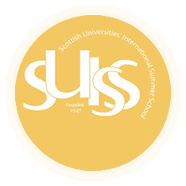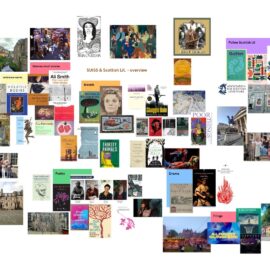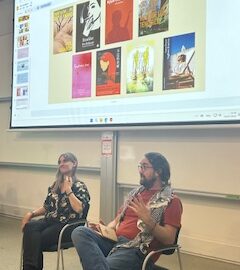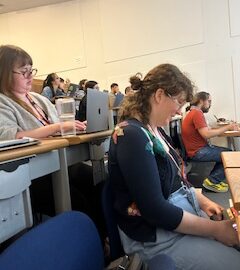Thanks to the generous support of Creative Scotland, we had the pleasure of welcoming Ariadna Pous and Enrique Maldonado Roldán—two accomplished Spanish translators of commercial literature—to our Contemporary and Scottish Literature courses this summer.
A central element of the Fellowship is the opportunity for our translators to share insights into their craft through presentations at our annual Translation Showcase, held each August. This year’s event took place at the University of Edinburgh, and we’re delighted to now share their talks and reflections with those who couldn’t attend in person.
We hope you enjoy their presentations as much as we did, and that you find them as insightful and engaging as we found the conversations on the day.
Ariadna Says:
I am truly grateful for the recognition granted to translators as key actors in the literary industry and I believe this is particularly relevant today, given the threats faced by our profession and the rest of creative fields through poor working conditions and the unregulated use of generative AI.
Among the opportunities currently available to translators, such as residencies and grants, I consider this fellowship at SUISS as a truly unique experience, since it gives us the chance to deepen our knowledge of British and Irish literature, and more specifically Scottish literature. In these courses we worked with a wide range of prominent texts and the expertise of the lecturers provided a really stimulating literary framework and tools to further explore literature in Scotland. Beyond the texts themselves, the lectures and seminars enriched my understanding of critical approaches, and I believe this will directly enhance how I work with my translations and present them to the Catalan audience, as our role as translators increasingly demands this involvement.
As a professional translating into Catalan, I found particularly interesting the parallels that might be drawn between Scottish literary history —and its use of Scots and Gaelic— and my own tradition. In Catalonia we currently have a thriving landscape of works by skilled translators and we have recently translated authors such as Ali Smith, Douglas Stuart and Muriel Spark, among others, but I have become more aware of the significant gaps across various genres: the poetry of the modern Scottish makars, the plays of John McGrath or David Greig, short stories by Jane Galloway or novels by James Robertson and Alisdair Gray, to name only a few. Exploring different aspects of Scottish literature I strongly felt that our own context would be particularly receptive to such works, and I have already identified potential projects and areas of interest to pursue in my work and share with publishers and colleagues.
Enrique says:
As a professional translator, it’s been a privilege and a pleasure to have the
opportunity to devote some weeks to the study of contemporary Scottish and British
literature. The broad spectrum of sensibilities and genres included in the four-weeks
program seems to me crucial to understand a Scottish literary scene as diverse as its
society, far away from the unavoidable cliches that certain nations inevitably have in
other latitudes.
The professional translator not only devotes time to rewriting a particular text,
but also to the selection of works that deserve to be read by foreign readers. From my
perspective, the professional translator is not a passive actor in the industry, but one who
wants to influence it, one who considers their responsibility to bring new voices or new
translated versions to a readership devoid of the language proficiency to read in the
original language. In this sense, the SUISS program has allowed me to devote time to
read the works of contemporary authors, some of them not yet translated into Spanish. I
have expressed my interest in translating their works to some of them and I will try to
persuade Spanish publishers to do so. Specifically I will try to publish in Spanish the
works of Harry Josephine Giles, Lelia Abulela and James Robertson.
But not just the authors studied in the lectures and seminars inspired me for
future translations. The opportunity to spend time in Scotland, and Edinburgh specially,
means the chance to spend time in bookshops, to read and buy the books that may end
being part of my portfolio as translators. And so, authors like Alan Warner, Janice
Galloway, Nan Shepherd and Tom Newlands find their way into my luggage before
flying back home.
Nevertheless, nothing of the aforementioned was so important. What I will
remember in the years to come, the memories that will accompany me are those directly
linked to the lectures and the seminars. Returning to the university after a considerable
length of time is being inspiring, motivating, rejuvenating. The friendships that started
in the classroom, the feeling of learning everyday, the fruitful reflection —that is the
main present SUISS and Creative Scotland gave me this Summer of 2025.
Ariadna Pous is a translator based in Barcelona. She has worked on several literary translation projects in collaboration with renowned publishers to bring voices into the Catalan literary landscape. She has had the privilege of translating works by authors such as Nora Ephron, Sigrid Nunez, Denis Johnson, Peter Burke and Philippe Sands, among others. Currently, she is translating an essay collection by Susan Sontag and a book by Scotland-based author, Kapka Kassabova, whose work she finds inspiring.
Enrique Maldonado Roldan has had the opportunity to translate many Scottish or Scotland-based authors throughout his professional career: (Lucy Ellmann’s Ducks, Newburyport; Andrew Pettegree and Arthur der Weduwen’s The Library: A Fragile History; Compton Mackenzie’s Whisky Galore; James Boswell’s An Account to Corsica).



